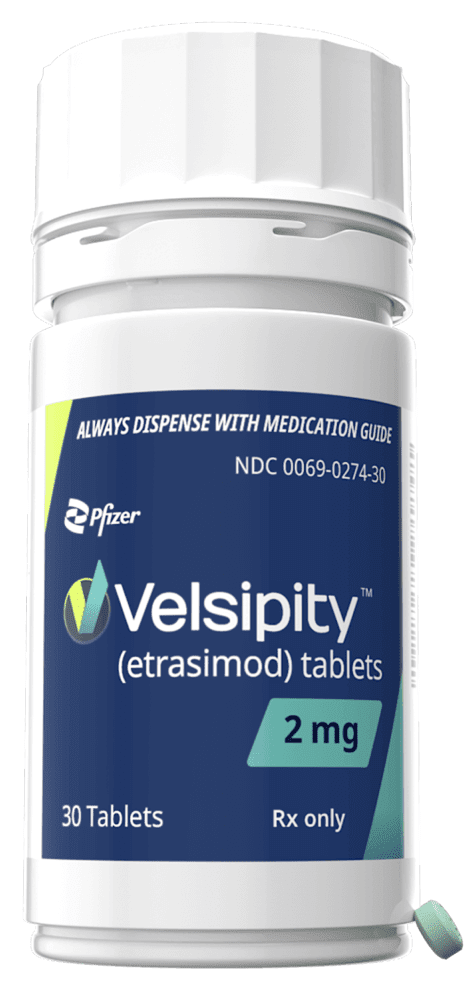Etrasimod Dosage
Medically reviewed by Drugs.com. Last updated on Dec 19, 2023.
Applies to the following strengths: 2 mg
Usual Adult Dose for:
Additional dosage information:
Usual Adult Dose for Ulcerative Colitis
2 mg orally once a day
Use: For the treatment of moderately to severely active ulcerative colitis
Renal Dose Adjustments
No adjustment recommended.
Liver Dose Adjustments
- Mild to Moderate Liver Dysfunction (Child-Pugh A to B): No adjustment recommended
- Severe Liver Dysfunction (Child-Pugh C): Not recommended.
Precautions
US FDA requires a medication guide to assure safe use. For additional information: www.fda.gov/drugs/drug-safety-and-availability/medication-guides
CONTRAINDICATIONS:
- Patients that in the last 6 months experienced myocardial infarction, unstable angina pectoris, stroke, transient ischemic attack, decompensated heart failure requiring hospitalization, or Class III or IV heart failure
- History or presence of Mobitz type II second-degree or third-degree atrioventricular (AV) block, sick sinus syndrome, or sino-atrial block, unless the patient has a functioning pacemaker
Safety and efficacy have not been established in patients younger than 18 years.
Consult WARNINGS section for additional precautions.
Dialysis
Data not available
Other Comments
Administration advice:
- Before initiation of treatment with this drug, assess the following:
- Complete blood count (CBC), including lymphocyte count
- Cardiac evaluation, including ECG to determine preexisting conditions
- Liver function tests
- Ophthalmic assessment including baseline evaluation of the fundus, including the macula
- Check list of prior medications to determine if the patient is taking drugs that can affect the heart rate or conduction, immunosuppressives, immune-modulating or anti-neoplastic drugs that can cause additive immunosuppressive effects
- Vaccinations - verify if history of varicella infection, documentation of a full course of vaccination against varicella zoster virus (VZV), and the need for antibody testing, or the need of vaccination (should be at least 4 weeks prior to treatment initiation).
- Skin examination: Observe prior to treatment and examine promptly any new suspicious skin lesions that appear during therapy.
- Swallow the tablet whole with or without food.
- If a dose is missed, take the missed dose at the next scheduled time; do not double the next dose.
Storage requirements:
- Store at 20C to 25C (68F to 77F), with excursions permitted between 15C to 30C (59F to 86F)
General:
- To report suspected adverse reactions, contact Pfizer Inc. at 1-800-438-1985 or FDA at 1-800-FDA-1088 or www.fda.gov/medwatch.
- There is a pregnancy exposure registry that monitors pregnancy outcomes in females exposed to this drug during pregnancy. Pregnant females and healthcare providers can contact the registry by calling 1-800-616-3791.
- Increased exposure of this drug in patients who are CYP450 2C9 poor metabolizers is expected with concomitant use of moderate to strong inhibitors of CYP450 2C8 or CYP450 3A4. Concomitant use is not recommended in these patients
Monitoring:
- Cardiovascular: Blood pressure
- Dermatologic: Suspicious skin lesions
- Hematologic: CBC including lymphocyte counts
- Hepatic: Liver tests
- Infections: Symptoms and signs of infection, infectious complications, and Immune reconstitution inflammatory syndrome (IRIS)
- Ocular: Changes in the eye (including evaluation of fundus and macula), and vision changes
- Respiratory: Pulmonary function if clinically indicated
Patient advice:
- Read the US FDA-approved patient labeling. (Medication Guide)
More about etrasimod
- Check interactions
- Compare alternatives
- Reviews (1)
- Side effects
- During pregnancy
- Drug class: selective immunosuppressants
- Breastfeeding
- En español
Patient resources
Other brands
Professional resources
Other brands
Related treatment guides
See also:
Further information
Always consult your healthcare provider to ensure the information displayed on this page applies to your personal circumstances.


